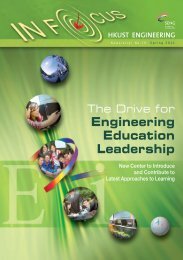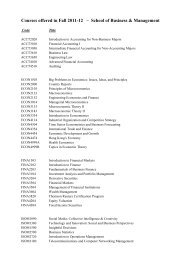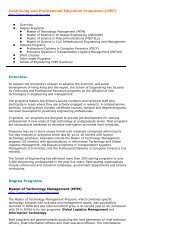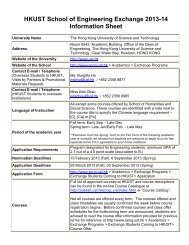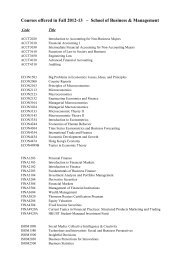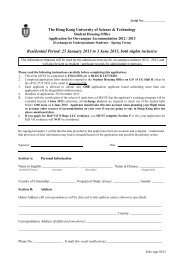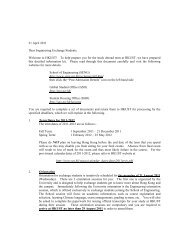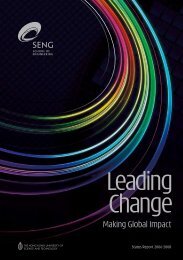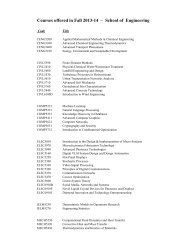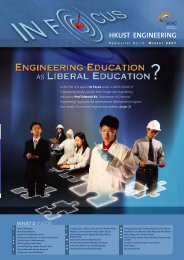pdf version - seng, hkust
pdf version - seng, hkust
pdf version - seng, hkust
You also want an ePaper? Increase the reach of your titles
YUMPU automatically turns print PDFs into web optimized ePapers that Google loves.
Empowering Excellence<br />
40<br />
Department<br />
of Civil and<br />
Environmental<br />
Engineering<br />
The Department of Civil and Environmental Engineering has<br />
used the forthcoming introduction of the four-year degree<br />
program in Hong Kong to completely revamp our undergraduate<br />
curriculum and teaching methods during the period under<br />
review. It has been an exciting if demanding time for colleagues<br />
working on the redesign.<br />
We already provide students with a useful choice of focus<br />
through our two undergraduate degree programs: one centered<br />
on civil and structural engineering; the other on civil and<br />
environmental engineering. Locating these programs within<br />
a broader, more flexible educational framework and outcomebased<br />
learning, we fully expect the result to be dynamic,<br />
innovative civil engineers with wide understanding of how the<br />
world works and confident written and oral communication skills<br />
in English and Chinese.<br />
Our approach to research has also taken significant steps<br />
forward. The Department’s productive and diverse faculty<br />
members have established a strong reputation for their<br />
academic research. Over the past three years, the Department<br />
has continued to be engaged in solving real-world issues.<br />
Green slope engineering – the use of plants to stabilize slopes<br />
instead of concrete – is one of the important initiatives being<br />
undertaken. Hazard risk and mitigation, sustainability in urban<br />
environments, and underground engineering are other key areas<br />
to which we are contributing.<br />
We have been assisted in such endeavors by HKUST’s excellent<br />
research facilities. These include a geotechnical centrifuge,<br />
equipped with the first biaxial servo-hydraulic shaking table and<br />
the second four-axial robotic manipulator in the world, and an<br />
environmental wind/wave tunnel. Such facilities enable us to<br />
increase knowledge of the impact of earthquakes and how soil<br />
structures behave, and engage in real-world testing for important<br />
structures in Hong Kong and beyond.<br />
In addition, our location has proved an enormous asset for our<br />
researchers and students in terms of projects and job prospects.<br />
Hong Kong’s special East-West orientation has enabled the<br />
Department to develop a great network with the international<br />
community and at the same time close China ties. And with its<br />
rapid urbanization, infrastructure development, and sustainability<br />
issues, I would say China is one of the places that currently<br />
needs civil and environmental engineers the most.<br />
Thus, the Department has had many opportunities to put what<br />
we do into practice or work with China counterparts on largescale<br />
meaningful projects. Air quality research within the Pearl<br />
River Delta is one area where we have made significant impact.<br />
In Hong Kong, our graduates can also gain the experience<br />
they need to launch their careers in the major league given the<br />
huge infrastructure projects planned, such as the Hong Kong-<br />
Zhuhai-Macau Bridge and the Guangzhou-Shenzhen-Hong Kong<br />
Express Rail Link.<br />
These factors, along with our strong record of achievement,<br />
have helped our drive in the past three years for greater student<br />
diversity through international recruitment and exchanges.<br />
Creating a more international body within the Department allows<br />
students to learn about intercultural issues first-hand. As civil<br />
engineers, there is a high chance that our graduates will spend<br />
part of their careers overseas and a multicultural experience at<br />
university is excellent advance preparation.<br />
I am also particularly keen to strengthen our links with industry<br />
and alumni and have been proactively working to achieve this<br />
over the past three years. By listening to their problems, sharing<br />
our findings, and working together to develop research projects<br />
with practical applications, the Department should be able to<br />
work effectively toward our goal of making more impact on<br />
society.<br />
Prof Christopher Leung<br />
Head of Civil and Environmental Engineering



